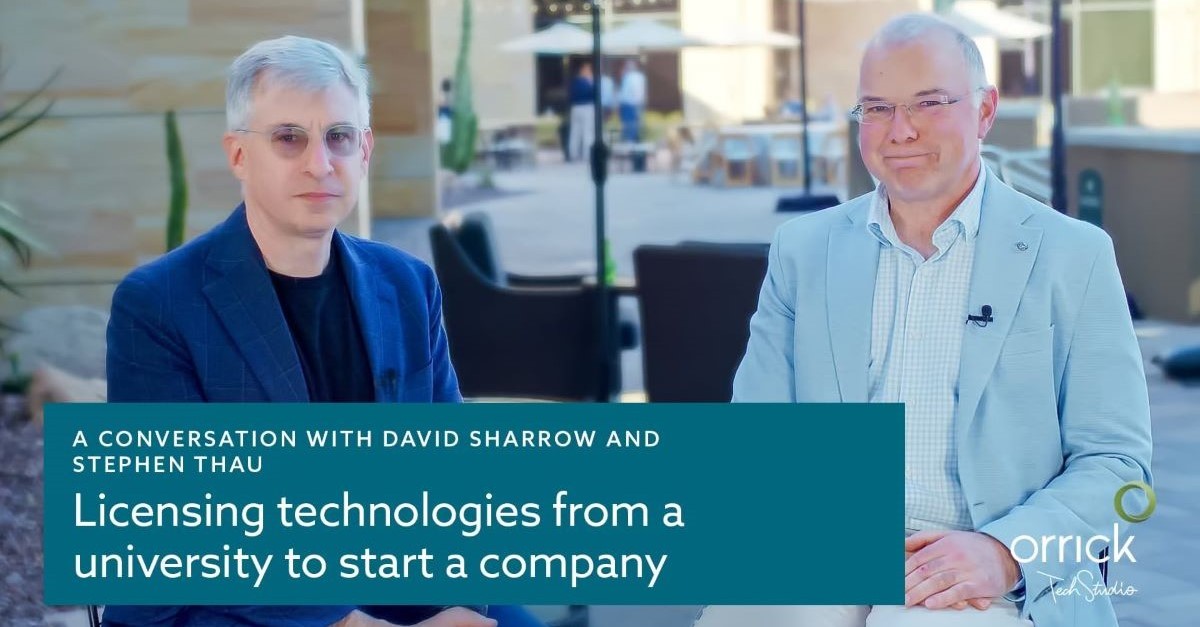Navigating University Technology Licensing for Startups: Key Considerations
4 minute read | September.23.2024
Starting a company by licensing technology from a university is a complex process with unique challenges and opportunities. Here are the most critical points for founders to consider when navigating university technology licensing.
Engagement with the University’s Technology Licensing Office
The first step for any founder interested in licensing university technology is to establish open and consistent communication with the university’s technology licensing office. This ensures the university is aware of the founder’s intentions, which helps prevent the technology from being licensed to another party.
Anticipate the Financial Components of the License
Licensing university technology involves negotiating various financial components, including royalties, upfront payments and milestone payments. These terms typically vary by industry.
- Milestone payments and royalties are likely to differ depending on whether the technology is for a medical device, pharmaceutical product, software or other products.
- It can be helpful for a proposed licensee of university technology to provide context of the market for the proposed product. Sharing information on potential sales might influence the types and amounts of payments the university might expect to receive.
For exclusive licenses, founders should expect to reimburse the university for its patent expenses. Founders should include this as part of the company formation budget.
Universities might ask for transfer fees in addition to equity if a licensee company is acquired. Minimizing these fees can make the company more attractive to potential buyers and investors.
Equity to Universities
Universities increasingly ask for equity in the companies to which they license technology, usually in common stock. Universities sometimes also seek anti-dilution protection, meaning they receive more shares to maintain their ownership percentage as the company raises additional funds. This anti-dilution protection differs from the price-based protection investors typically receive, and it is critical to understand the impact of antidilution protection on founder equity ownership. Universities may also ask for the right to participate in future funding rounds.
Board Participation and Investor Rights
While board membership for universities is rare, universities may sometimes request board observer rights, especially in the early stages of a company’s development. This is often not objectionable, particularly with a built-in sunset provision to the university’s board observer rights, although some founders may have concerns.
Royalties and Royalty Stacking Provisions
Given the early-stage nature of much university technology, patent portfolios and landscapes may change over time. To protect their interests, founders should include a royalty stacking provision in the agreement. That allows a company to reduce royalty payments to the university if the company must also pay royalties to other parties. This helps ensure that if additional technologies need to be licensed from other parties, the overall royalty burden remains manageable.
Diligence and Milestones
Universities often require diligence milestones related to the development of products that incorporate licensed technology. These milestones ensure that the technology is being developed at a reasonable pace. However, universities tend to be more flexible than private parties and generally accept reasonable timelines. Founders should prepare for worst-case scenarios when negotiating these milestones, as universities understand that technical difficulties can arise.
Sublicensing Rights and Sublicensing Fees
Founders should ensure they have the flexibility to sublicense the technology to other companies while meeting the university’s requirements for approval and reporting. Universities will typically also ask for a cut of any proceeds a company makes on sublicensing the technology. It is important to craft provisions carefully to exclude certain types of payments, such as reimbursement of expenses and purchases of equity. It is also important to exclude certain sublicensees, such as distributors and wholesalers, from sublicensing fees to avoid excessive financial obligations.
Know-How Considerations
Know-how refers to the technical knowledge associated with the licensed technology. It can be a complex aspect of licensing agreements. Universities often seek to include know-how in the agreement, ensuring they receive royalties even if patents do not issue or are not applied for in certain jurisdictions. Nailing down exactly what constitutes know-how can be challenging. Founders may find it advantageous to exclude it from the agreement in some cases.
Conclusion
Licensing technology from a university to start a company involves navigating a variety of complex legal and financial issues. By understanding the key considerations, founders can better position themselves for successful negotiations and long-term success. For those embarking on this journey, close collaboration with experienced legal counsel is essential to ensure that all aspects of the agreement align with the company’s strategic goals.
Learn More
August.26.2024 | 11 minute watch
Stephen Thau and David Sharrow discuss key considerations and common terms for licensing technology from universities to start companies, including communication with technology licensing offices, cost implications, royalty structures, due diligence, equity stakes for universities, sublicensing rights, and investor rights.
